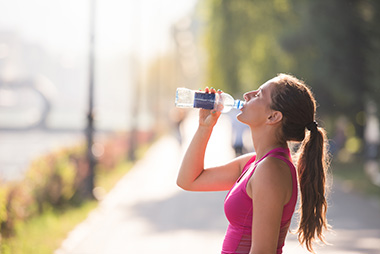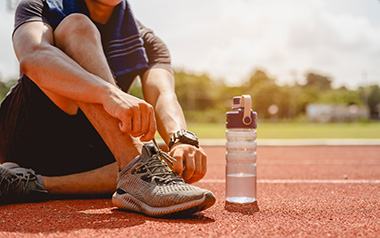Running Essentials: Hydration and Electrolytes

Water. It hydrates us, makes up 50% - 60% of your body weight, flushes out all the bad toxins and provides your body with precious minerals. Hydration is a crucial aspect to how our body functions, especially during exercise - once dehydrated, our physical performance decreases. As a consequence, it’s imperative that you drink water not only during exercise but before and after as well. Just like food, it is the fuel that keeps us going during physical activities. The more you exercise, the more water you will need.
The Importance of Hydration
You can lose a lot of fluid when you exercise, especially in hot environments, you can lose as much as 1 - 2 litres per hour. So, do take care to drink more during physically demanding activities. With that being said, make sure you don’t over-hydrate yourself as this can result in vomiting and problems with balance. To give you an idea of how much you should be drinking, it’s recommended that you drink at least 6 - 8 glasses of water a day. When you exercise, this will of course increase. Typically, tap water is absolutely fine in terms of its cleanliness and healthiness - so unless the situation calls for it, there is no need to buy bottled water.
Your performance during exercise, say during a run, can also benefit from drinking caffeinated beverages. Many runners find that caffeine boosts their running performance. A cup of coffee contains around 80mg of caffeine, which is usually sufficient to provide the boost. Take care not to indulge in too much caffeine though. While it does indeed boost our physical performance during cardio - it also has the potential to contribute to dehydration. So, for every coffee, tea or Coca-Cola that you have, ensure that you drink another glass of water to prevent caffeine's diuretic effect. Otherwise, you risk an accelerated dehydration, which will occur even quicker during exercise. For exercise, caffeine is good in moderation, but don’t let it spoil your workout.
Hydrating For A Run

Before you go for a run, always drink 500ml - 1 litre of water at least 1 hour before you begin. This will secure your hydration for the challenge ahead. It also makes certain that any excess fluids will be excreted from your body to avoid it splashing and sloshing around in your gut whilst running. If you do this and it's not a hot day, then you should be able to leave your water bottle behind. For runs that are only 20 - 30 minutes in length, drinking the aforementioned amount should be sufficient to maintain hydration. If it’s a hot summer's day and you’re running a long distance without any shade however, take it with you. Take 3 small sips every 5 - 10 minutes, being careful not to take big gulps as this can cause discomfort when running. An easy way to check that you are not dehydrated before your run is to check the colour of your urine. The clearer your urine, the more hydrated you’ll be.
Electrolytes
Another factor that you should consider before you run is your body’s electrolytes. Electrolytes are essential minerals found in our bodies. These include sodium, calcium, potassium, chloride, phosphate and magnesium, and they play an important part in your running performance. Electrolytes direct water to the areas in the body where it’s most needed, maintaining the body’s fluid balance. We lose electrolytes through sweat, so if you are exercising for an extended period of time, you'll need to replenish those lost electrolytes.
Electrolytes also play an important role in controlling muscle action. Water accounts for approximately 76% of our muscle mass. So, the less water these muscles have, the weaker they will be. When we run, we use our quadriceps, hamstrings, calves, glutes, hip flexors and our core. As we use these muscles during our run, they will need water to stay at optimal performance levels. This is especially important to remember if you’re training for a marathon or another long distance run. The essential minerals that move the water are sodium and potassium. So, you must ensure that the food and drink you use to replenish your electrolytes contain these minerals.
Other electrolytes that play a role in controlling muscle action include magnesium and calcium. Unlike the previous, these will affect the excitability of the nerves and the corresponding muscles. If you’re low in these electrolytes, there is a possibility that you will get muscle cramps. So, make sure you have something to replenish your electrolyte levels as you run. Otherwise you risk dehydration, your muscles cramping up or getting fatigued at a much quicker rate. Most people will resort to buying sports drinks such as Lucozade or Powerade, both of which provide a high quantity of electrolytes as well as carbohydrates for energy. But, in situations where such drinks aren’t available - you can also simply add half a teaspoon of salt to a bottle of water.
This will bring your body’s electrolyte balance back to normal. If your goal is weight loss, it’s important to remember to factor in these drinks to your daily calorie count. Many types of food also replenish electrolytes, chicken, bananas, almonds, avocados, olives and raisins all help to keep your levels balanced. Carrying one of these sports drinks or snacks rich with electrolytes is advised if you’re going to run a long distance race or if you’re taking part in a long workout. If you don’t, it’s likely that you’ll hit your limit before you reach the end.
It is also possible for your electrolyte levels to be too high, so do not replenish your levels excessively. Depleted or excessive electrolyte levels can result in an irregular heart rhythm and dizziness. Both of which are best to avoid during and after physical exertion.








